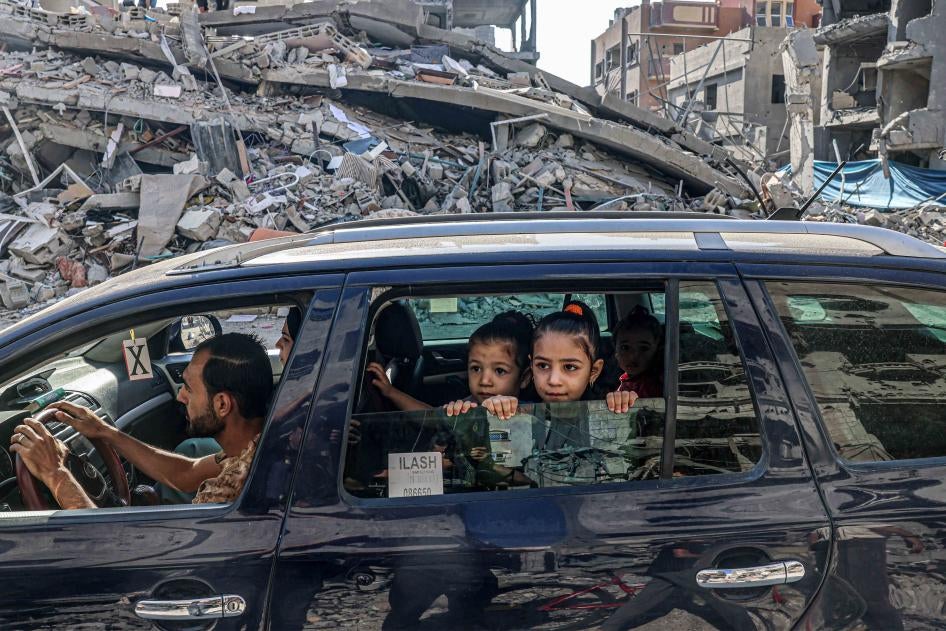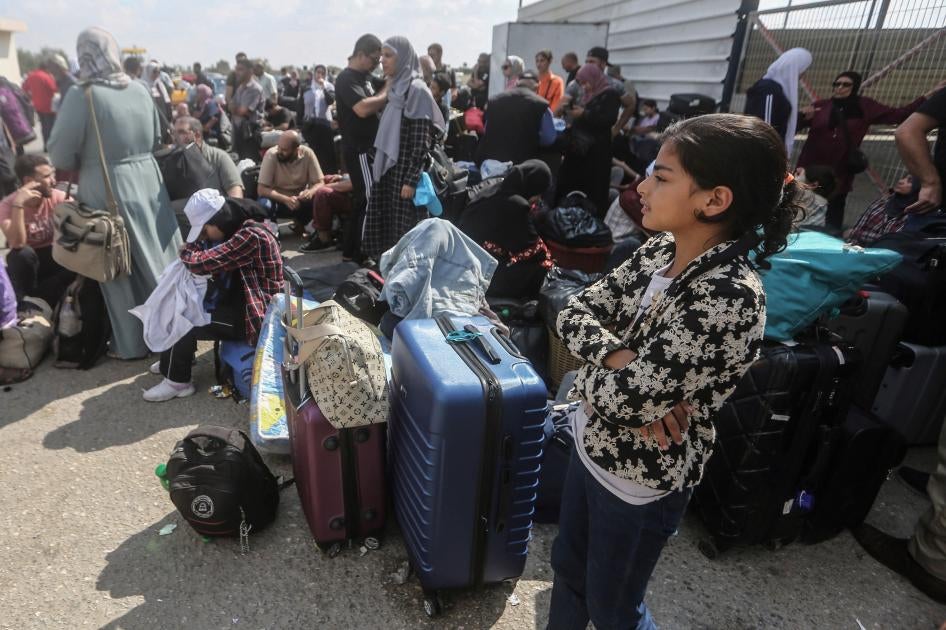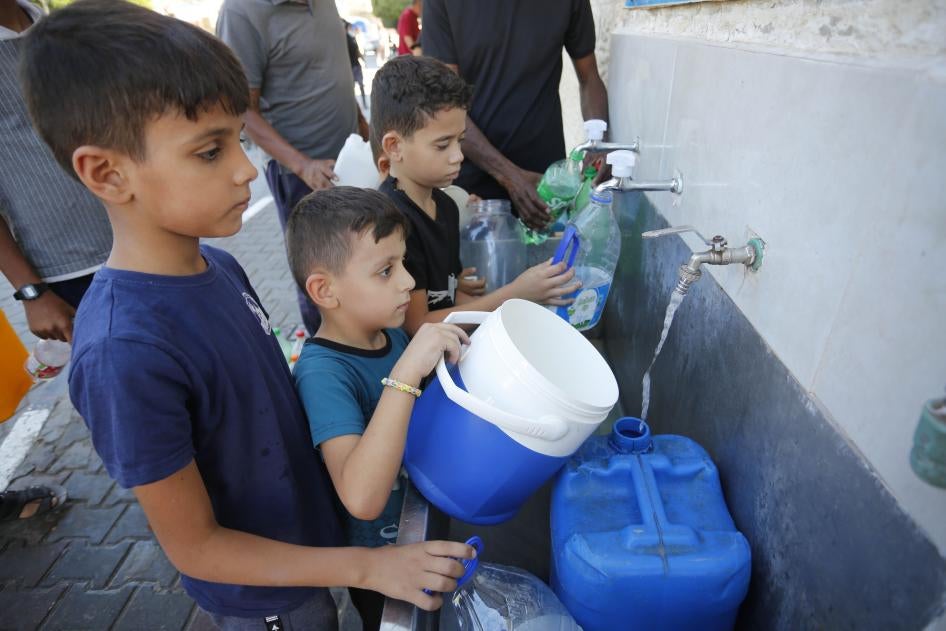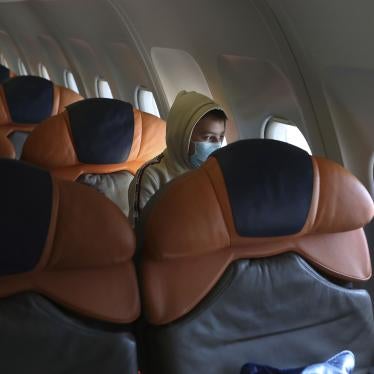Update October 19, 2023: President Joe Biden announced that the United States mediated an agreement allowing the movement of up to 20 trucks of food, medicine, and water into Gaza. The United Nations Office for the Coordination of Humanitarian Affairs (OCHA) has urged negotiators to raise their "level of ambition.” OCHA reported that, in August 2023 alone, 12,072 truckloads of "authorized goods entered Gaza through the Israeli and Egyptian-controlled crossings." After the total siege on the civilian population on October 9, a single dispatch of 20 truckloads does not adequately address the dire humanitarian situation in Gaza, Human Rights Watch said. Israel’s international partners should press the Israeli government to restore water and electricity supplies and lift its unlawful restrictions on aid delivery and closure.
(Jerusalem) – The Israeli government should immediately end its total blockade of the Gaza Strip that is putting Palestinian children and other civilians at grave risk, Human Rights Watch said today. The collective punishment of the population is a war crime. Israeli authorities should allow desperately needed food, medical aid, fuel, electricity, and water into Gaza, and let sick and wounded civilians leave to receive medical treatment elsewhere.
Israel announced on October 18, 2023, that it would allow food, water, and medicine to reach people in southern Gaza from Egypt, but without electricity or fuel to run the local power plant or generators, or clear provision of aid to those in the north, this falls short of meeting the needs of Gaza’s population.
The Israeli bombardment and total blockade have exacerbated the longstanding humanitarian crisis resulting from Israel’s unlawful 16-year closure of Gaza, where more than 80 percent of the population relies on humanitarian aid. Doctors in Gaza report being unable to care for children and other patients because the hospitals are overwhelmed by victims of Israeli airstrikes. On October 17, a munition struck al-Ahli Hospital in Gaza City, causing mass casualties; Hamas blamed Israel for the strike, while Israel said it was a rocket misfire by Palestinian militants. Human Rights Watch is looking into the strike.
Public health officials said the lack of water, contamination of areas by sewage, and many bodies that cannot be safely stored in morgues could trigger an infectious disease outbreak.
“Israel’s bombardment and unlawful total blockade of Gaza mean that countless wounded and sick children, among many other civilians, will die for want of medical care,” said Bill Van Esveld, associate children’s rights director at Human Rights Watch. “US President Joe Biden, who is in Israel today, should press Israeli officials to completely lift the unlawful blockade and ensure the entire civilian population has prompt access to water, food, fuel, and electricity.”
Senior Israeli officials have said the total blockade of the Gaza Strip, where children comprise nearly half of the population of 2.2 million, is part of efforts to defeat Hamas, following its October 7 attack on Israel. Hamas-led Palestinian fighters killed more than 1,300 people, according to Israeli authorities, and took scores of civilians, including women and children, as hostages. On October 9, Israeli Defense Minister Yoav Gallant announced “a complete siege … no electricity, no water, no food, no fuel. We are fighting human animals, and we act accordingly.” The Palestinian Health Ministry has reported, as of October 18, that 3,478 Palestinians have been killed. The Palestinian rights group Defense for Children International – Palestine reported that more than 1,000 children are among those killed.
The laws of war do not prohibit sieges or blockades of enemy forces, but they may not include tactics that prevent civilians’ access to items essential for their survival, such as water, food, and medicine. Parties to the conflict must allow and facilitate the rapid passage of impartial humanitarian aid for all civilians in need. Aid may be inspected but not arbitrarily delayed.
In addition, during military occupations, such as in Gaza, the occupying power has a duty under the Fourth Geneva Convention, to the fullest extent of the means available to it, “of ensuring the food and medical supplies of the population.” Starvation as a method of warfare is prohibited and is a war crime.
Under international human rights law, states must respect the right to water, which includes refraining from limiting access to, or destroying, water services and infrastructure as a punitive measure during armed conflicts as well as respecting the obligations to protect objects indispensable for survival of the civilian population.
Israel’s total blockade against the population in Gaza forms part of the crimes against humanity of apartheid and persecution that Israeli authorities are committing against Palestinians.
News media reported on October 17 that Israel had refused to allow humanitarian aid into Gaza, while Egypt was refusing to allow Palestinians to cross into the Sinai. Egypt and Israel should permit civilians to pass through their respective crossings to seek at least temporary protection or life-saving medical care, while also ensuring that anyone who flees is entitled to voluntary return in safety and dignity.
Lack of Medical Care
Shortages of medical equipment, supplies, and medication in the face of overwhelming casualties are causing avoidable deaths in hospitals in the Gaza Strip. More than 60 percent of patients are children, Dr. Midhat Abbas, director general of health in Gaza, told Human Rights Watch. An intern emergency room doctor at Al-Aqsa Martyrs Hospital wept while speaking to Human Rights Watch by phone on October 15:
Yesterday, in the intensive care unit, it was full, and all ventilators were in use. A child came in with head trauma who needed a ventilator. They had to choose between two children, who would die. He [the doctor] made a decision that one child was more promising to treat, so we were forced to switch the ventilator, and the other child died.
A doctor at the Northern Medical Complex said that on the night of October 14, intensive-care unit medics had to disconnect an adult patient from a ventilator to use it for a 10-year-old. He said a lack of medical supplies had obliged him to stitch a woman’s head wound without gloves or sterile equipment.
In a voice message on October 14, a doctor at al-Shifa hospital described a group of patients with “back wounds, including compound fractures, that can be really painful.” He said that the hospital had run out of painkillers to administer to them.
Ghassan Abu Sitta, a British surgeon volunteering at al-Shifa hospital, posted on social media on October 10, that “the hospitals, because of the siege, are so short of supplies that we had to clean a teenage girl with 70 percent body surface burns with regular soap because the hospital is out of chlorhexidine (antiseptic).” On October 14, he said in a voice note shared with Human Rights Watch: “We are no longer able to do anything but the most life-saving surgeries” because medical supplies were exhausted, and deaths and injuries had caused staff shortages.
More than 5,500 pregnant women in the Gaza Strip are expected to deliver within the next month, but face “compromised functionality of health facilities” and lack of “lifesaving supplies,” the United Nations Population Fund said on October 13.
“We need insulin [for diabetics],” said the head of a UN Relief and Works Agency for Palestine Refugees in the Near East (UNRWA) shelter on October 15. “People are dying.” The shelter was overwhelmed with 15,000 internally displaced people.
The UN World Health Organization stated on October 14 that it had flown medical and basic health supplies for 300,000 patients to Egypt, near the Gaza Strip’s southern border, and more than 1,000 tons of other humanitarian aid had been shipped to the area. As of October 17, though, humanitarian workers and aid remain blocked via the Rafah border crossing. Israeli attacks have reportedly hit the crossing repeatedly, rendering it unsafe. Egyptian Foreign Minister Sameh Shoukry said four Egyptian aid workers were injured in the Israeli strikes and that “there is not yet any sort of authorization for a safe passage from the other side of the crossing.”
Israel’s order on October 13 to all civilians located in the north of the Gaza Strip to evacuate to the south exacerbated the medical crisis: 21 hospitals currently holding more than 2,000 patients are located in this region. The World Health Organization said the evacuations “could be tantamount to a death sentence” for the sick and injured and said hospitals were already beyond capacity in the southern Gaza Strip. A pediatric doctor at Kamal Adwan Hospital said evacuating would likely cause the deaths of seven newborns in the ICU who were connected to ventilators.
Dr. Abu Sitta said that Israel’s evacuation order forced the Mohammed al-Durra Pediatric Hospital east of Gaza City to close, including a neonatal intensive care unit supported by the charity he volunteers with, Medical Aid for Palestinians.
The sick and wounded, including children and pregnant women, have not been allowed to cross Rafah into Egypt or the Erez crossing into Israel to receive treatment. Dr. Abbas, the director general of health, said, “We are in desperate need of a safe humanitarian passage for patients immediately, [and] we need field hospitals immediately.”
Electricity
On October 7, Israeli authorities cut the electricity it delivers to Gaza, the main source of electricity there. Israeli authorities also cut fuel necessary to run Gaza’s only power plant. The power plant has since run out of fuel and shut down. On October 17, Dr. Abbas told Human Rights Watch by phone that hospitals’ emergency generators will run out of fuel “within hours.”
The International Committee of the Red Cross regional director warned on October 11 that the power cuts are “putting newborns in incubators and elderly patients on oxygen at risk. Kidney dialysis stops, and X-rays can't be taken. Without electricity, hospitals risk turning into morgues.”
Water and Sewage
The UN Office for the Coordination of Humanitarian Affairs (OCHA) reported that 97 percent of the groundwater in Gaza is “unfit for human consumption,” leaving people dependent on the supply of water from Israel and on the territory’s desalination plants. Israel cut off all water on October 11, and most desalination also stopped that day due to the cutoff in electricity, leaving about 600,000 people without clean water, Omar Shatat, deputy director general of Gaza’s Coastal Municipalities Water Utility, told Human Rights Watch.
The last functioning desalination plant stopped operating on October 15. Israel partially resumed water delivery that day, but only to the eastern Khan Younis area, and it amounted to less than 4 percent of the water consumed in Gaza prior to October 7, according to OCHA.
UNRWA warned that “people will start dying of severe dehydration” unless access to water is resumed. The Associated Press reported on October 15 that a doctor had treated 15 cases of children with bacterial dysentery due to lack of clean water, which can also cause diseases like cholera, particularly in children under 5.
“Israel has cut off the most basic goods necessary for survival in Gaza, where there are more than a million children at risk,” Van Esveld said. “Every hour that this blockade continues costs lives.”









